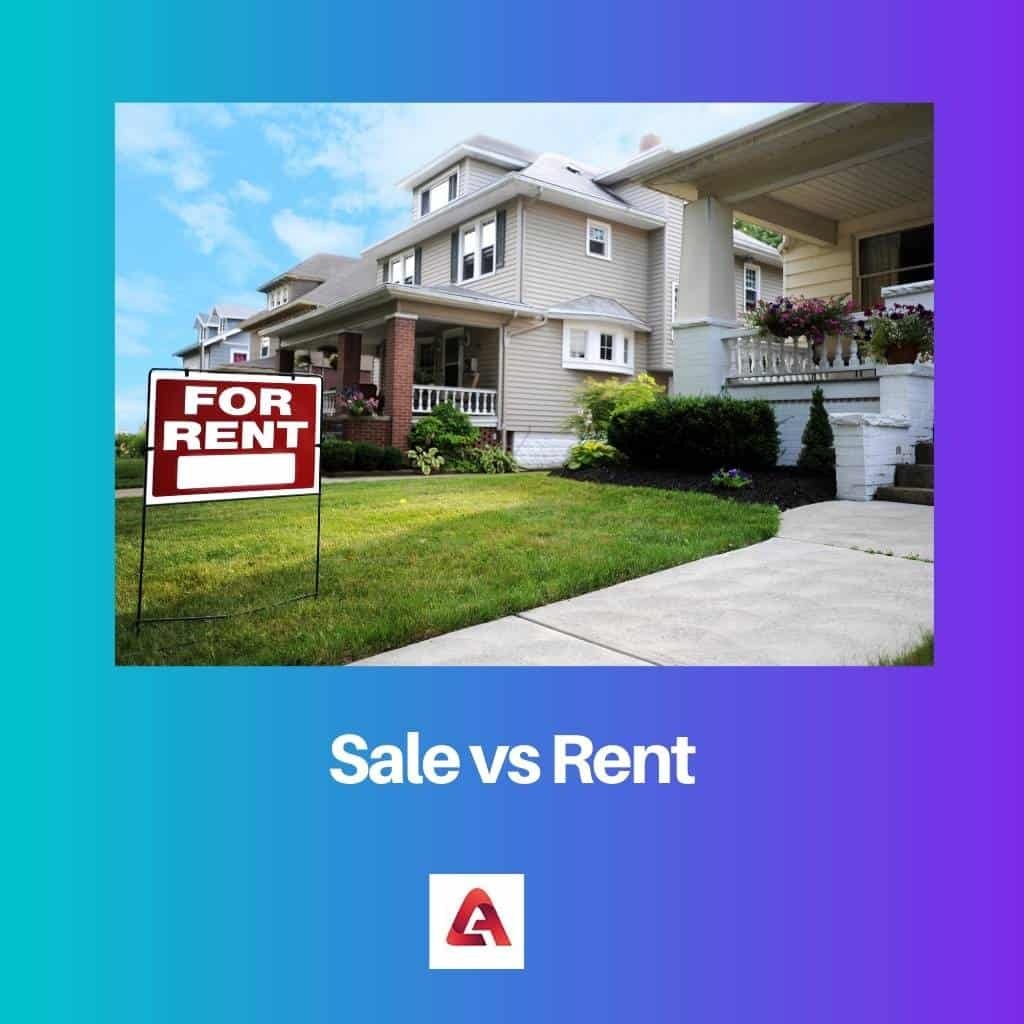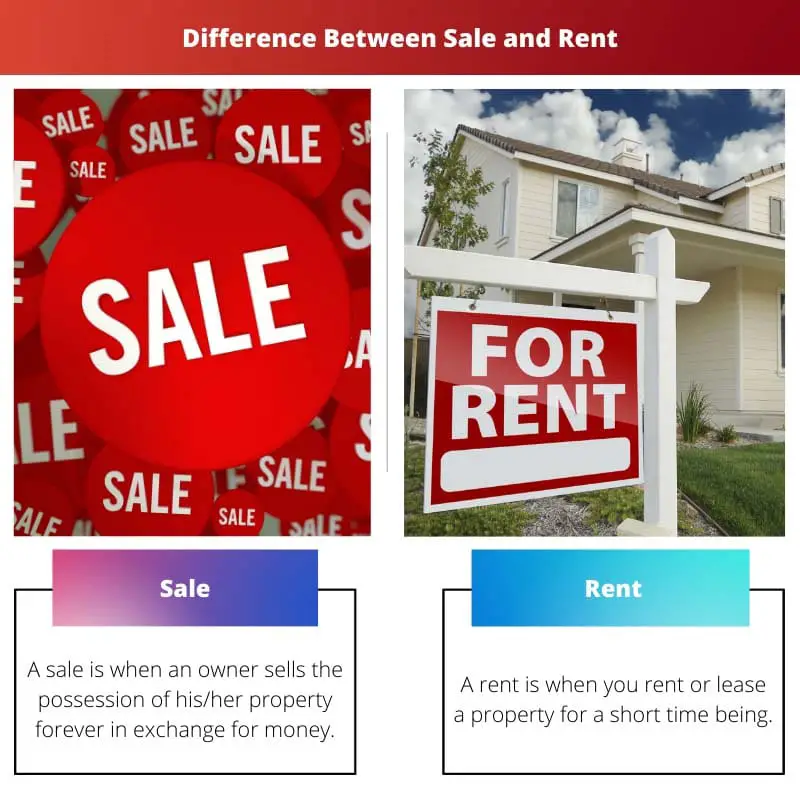Nowadays, financial balance is essential. Both selling and renting affect the personal financial condition.
Key Takeaways
- Sale refers to transferring ownership of a property or asset from one party to another in exchange for money. In contrast, rent refers to the temporary use of a property or asset in exchange for periodic payments.
- Sale is a one-time transaction, while rent involves an ongoing landlord and tenant agreement.
- Sale is more appropriate for long-term investments or for acquiring a permanent residence. At the same time, rent is more suitable for short-term use or for those unable to purchase a property outright.
Sale vs Rent
Sale is when you give up the possession of your property in exchange for money, and rent is when you lease your property in exchange for money on a monthly or yearly basis without giving up your ownership.

Sale is when you transfer the property you possess to someone else in exchange for money. This is a legal process, and after selling the property, you do not have any right over that property.
Rent is when you lease your property to someone to use temporarily in exchange for money. The owner remains the same.
Comparison Table
| Parameters of Comparison | Sale | Rent |
|---|---|---|
| Definition | A sale is when an owner sells the possession of their property forever in exchange for money. | Rent is when you rent or lease a property for a short time. |
| Owner | Owner changes in a sale. | The owner does not change in rent. |
| Expense | Selling includes more money than renting. | Renting includes less money than selling. |
| Time | Selling is permanent. If you sell, you lose possession of that property forever. | Rent is temporal. Renting can be done for a few months or years. |
| Ownership | The seller loses the right, and the buyer gets ownership. | The owner does not lose ownership, and the buyer does not get ownership. |
What is Sale?
Sale is a legal process of shifting ownership. A seller sells any property in exchange for money, and the buyer buys it by providing that money.
Sale is a permanent settlement. When a person sells any property, that person loses rights and privileges over that property.
The buyer and their descendants enjoy that property for eternity unless they sell it to someone else.
Any property can be sold. House, land, artefacts, any commodity or object can be subjected to be sold.
After the sale, the sellers lose all the rights and liberties over the property. They can not call their property of theirs.

What is Rent?
Rent is leasing a property temporarily for the time being. Rent does not shift the ownership from the seller to the buyer.
The owner and buyer sign a lease agreement that states all their demands and the lease period and mentions the amount of money for renting that property. Once that agreement expires, the buyer loses his rights and can not use it further.
Renting a property, house, hall, products, or goods is possible. You can even rent a service. Renting is paying money to use someone else’s property.
Renting is good for the environment as a product or property gets used more efficiently, which is better than generating other similar products. Sustainability is essential in today’s day and time.

Main Differences Between Sale and Rent
- Selling is switching the ownership to the buyer. Whereas renting keeps the owner the same, the buyer temporarily takes a lease from the owner.
- The seller loses all kinds of rights over the property after selling. But they do not lose the rights after giving the property on rent. The property still belongs to them. By giving to rent the property, they give it to the buyer to use temporarily.
- The sale is for life long. You can not get it back unless the new owner sells it back to you. Rent is for a specific period, decided by the seller and buyer.
- Selling a property includes more money than renting. Depending on the property type, the owner gets a lot of money by selling a property. To rent, one needs less money. Renting a property is not very expensive, but the amount of money depends on the property type.
- After the sale, the buyers can get a loan against that property if they want, but after the rent, the buyer can not take a loan against it as it does not belong to him/her.

- https://search.proquest.com/openview/d221e8388021bb542589c058485bbf06/1?pq-origsite=gscholar&cbl=44506
- https://www.sid.ir/en/journal/ViewPaper.aspx?id=429781
Last Updated : 11 June, 2023

Chara Yadav holds MBA in Finance. Her goal is to simplify finance-related topics. She has worked in finance for about 25 years. She has held multiple finance and banking classes for business schools and communities. Read more at her bio page.

The article does an excellent job of providing a nuanced comparison between sale and rent.
It is indeed a very thorough analysis that allows for better decision-making.
The informative nature of the content is commendable, and the logical structure makes it easy to follow.
This kind of clear and comprehensive approach makes the subject accessible to a wider audience.
The comparison table presents a clear distinction between the two options, making it easy to grasp the differences.
It is certainly illuminating without being overly complex.
Absolutely, I appreciate having such concise information at hand.
The article explains the financial implications of the decision to sell or rent property very well.
This is an informative piece that highlights key considerations for property owners.
The article manages to maintain a sense of objectivity without being overly technical, which is appreciated.
It strikes a good balance between being informative and approachable, all the while being highly relevant.
The detailed explanations of the concepts of sale and rent are extremely useful for someone like me who is new to property matters.
It’s a comprehensive guide to understanding these concepts and their implications.
I find this information to be very helpful as I am currently considering whether to sell or rent my property.
It is definitely important information to take into account. The article has covered all the major aspects.
This article is a valuable resource for anyone looking to understand the pros and cons of selling and renting.
It would be difficult to find a better explanation of the factors involved in the decision-making process.
This article provides a thorough comparison of the advantages and disadvantages of selling versus renting property.
I completely agree. It is a valuable resource for those making real estate decisions.
This is a balanced and insightful analysis.
As someone who is currently involved in a real estate transaction, I found this article to be particularly relevant and helpful.
It’s definitely a piece that offers useful insights and practical advice.